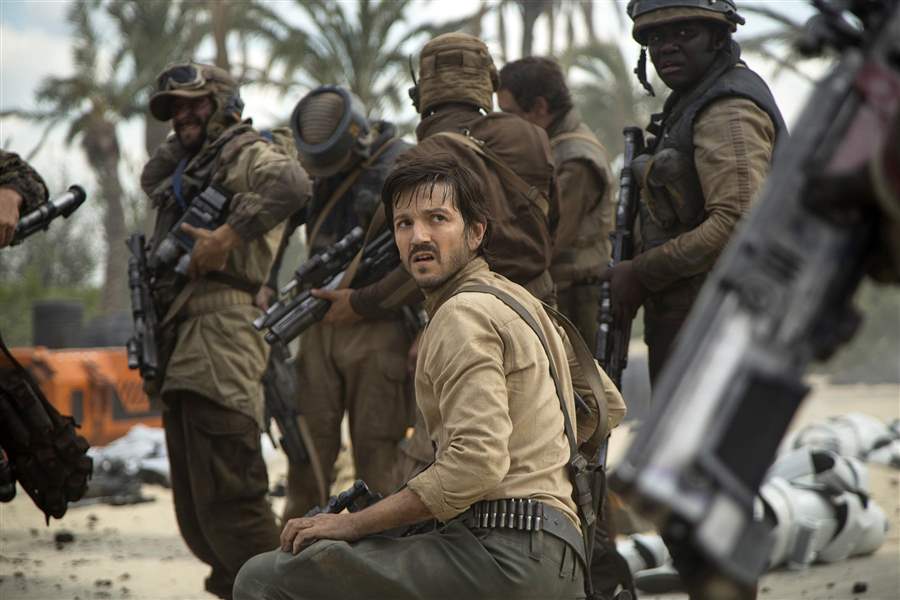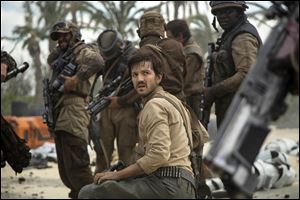
CULTURE SHOCK
Hollywood diversity a work in progress
2/15/2018
Diego Luna as Cassian Andor appears in a scene from, "Rogue One: A Star Wars Story."
ASSOCIATED PRESS
It wasn't so long ago in Hollywood that diversity in movies meant minorities cast in racial stereotype roles — or even worse, whites cast in the offensive parts.
Then things sorta improved.
In the first Star Wars trilogy, for example, diversity was mostly male white actors speaking with either an American or British accent.

Diego Luna as Cassian Andor appears in a scene from, "Rogue One: A Star Wars Story."
It wasn't until a friend of mine named Nick, who is Mexican-American and a Star Wars fan, commented on the lack of minorities in Star Wars that my eyes were opened to just how white that galaxy was.
"You'd think there'd be at least one Mexican,” he told me. “There are a bunch of white dudes and one black dude (Lando Calrissian played by Billy Dee Williams), but not a single Mexican?”
And it wasn't just Latinos who were noticeably absent in those movies, he noted. There weren't Asians or Arabs or Native Americans. In fact, the majority of humanoids of color were actually white men wearing alien masks.
Our conversation took place one night shortly after the release of Episode I: The Phantom Menace in 1999, which has its own racial problems: Jar-Jar Binks as an amphibious Stepin Fetchit, and aliens with vaguely racist Asian and Italian accents.
So when Lucas cast Jimmy Smits as Senator Bail Organa in the last two chapters of the Star Wars prequels in the early 2000s, I thought of Nick. Finally, there was someone “like me,” as he once said, in a Star Wars movie.
I haven’t talked with Nick in years, but I imagine him to be especially thrilled with the diversity in 2016’s Rogue One: A Star Wars Story's cast: Mexican actor Diego Luna, Chinese actors Donnie Yen and Wen Jiang, and Riz Ahmed, an English actor of Pakistani descent — all of whom play heroes.

Just as Star Wars has grown far more diverse — The Last Jedi, for instance, featured a subplot involving Rebel heroes who are black and Asian, Finn (John Boyega) and Rose (Kelly Marie Tran), respectively, and a galactic hacker who is Puerto Rican (Benicio del Toro) — so, too, have big-screen superheroes.
Last summer's Wonder Woman, for example, finally brought a major female character in a film of her own. The effort was rewarded with a 92 percent approval on Rotten Tomatoes and more than $400 million domestically and $800 million worldwide.
And the just-released Black Panther gives us our first solo film to feature a black superhero in the Marvel Cinematic Universe. Black Panther is expected to set a box-office record for the President’s Day four-day weekend. And as of Thursday morning, the film is enjoying a 97 percent approval on Rotten Tomatoes. (I gave it 4.5 stars in Thursday’s review for The Blade.)
Nearly 20 years ago I wouldn’t have fully considered the movie’s importance. Thanks to my conversation with Nick, I do now.
After decades of Hollywood making movies with the ethnic range of a typical Congress session, as in various shades of pale, a more inclusive palate of race, gender, and sexuality on the big screen is important and necessary.
Growing up, I identified with Luke Skywalker. I identified with my hero for many reasons, one of which, even if it was subconscious, was that he looked like me. Frankly, I could have just as easily identified with other Star Wars heroes Han Solo and Obi-Wan Kenobi, who are also white.
If I were black, self-identifying with one of the Star Wars heroes based on skin color would have limited options to one: Lando. If I were Latino, Asian, or Arab, Star Wars would offer no reflection of my race. For girls, it was Princess Leia, so white and nothing else.
Wonder Woman and Black Panther are, hopefully, a vanguard of films and TV shows, such as CW's Supergirl and Black Lightning that are changing by acknowledging our planet is diverse, despite what you see on C-Span. And provide children — regardless of race, gender, and sexuality — a hero with whom to identify.
And that’s something we can all identify with.
Contact Kirk Baird at kbaird@theblade.com or 419-724-6734.